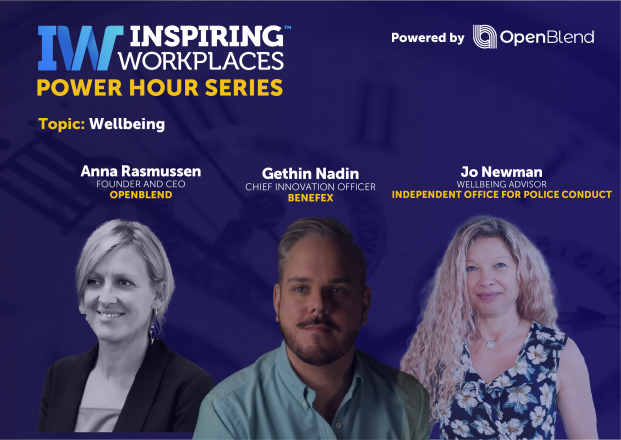
08th November 2024
Prioritizing Workplace Well-Being: Leadership Insights

World Mental Health Day on October 10 highlighted the importance of mental health at work, with the World Economic Forum urging businesses to build resilient workplaces. Leaders like Unilever’s Diana Han emphasized role-modeling vulnerability, holistic well-being approaches, and culturally sensitive support to create environments where employees can thrive both mentally and physically.
This article was written by Kate Whiting and published by World Economic Forum.
- The theme of World Mental Health Day on 10 October is ‘Mental Health at Work’.
- 12 billion working days are lost every year to depression and anxiety, which costs the global economy $1 trillion in lost productivity, the World Health Organization reports.
- The Forum released a call to action this year to ‘Build Resilient and Healthy Workplaces’, with recommended interventions to improve mental health in the workplace.
- Here’s how leaders discussed ways to prioritize mental health at work at the World Economic Forum’s 2024 Sustainable Development Impact Meetings.
“It’s really difficult right now getting up in the morning, seeing the headlines that people see, let alone all the things that are part and parcel of daily life – and certainly daily life in the world of work where stress is inherent.”
So says Diana Han, Unilever’s Chief Health and Well-Being Officer, who is on a mission to add healthy years to the lives of the company’s 128,000 employees across 190 countries.
Mental Health at Work is the theme of this year’s World Mental Health Day on 10 October, with the World Health Organization (WHO) working with partners to highlight the connection between mental health and work.
The Forum’s Healthy Workforces initiative aims to raise awareness, with a call to action earlier this year, suggesting concrete interventions for improving mental health in the workplace.
Mental health at work
More than half of the global population (60%) works and around 15% of working-age adults live with a mental disorder, according to the WHO.
Around 12 billion working days are estimated to be lost every year to depression and anxiety alone, which costs the global economy $1 trillion in lost productivity.
The WHO says that workplaces can protect mental health by providing financial stability, an inclusive community, building confidence and a sense of achievement, and creating a routine.
But work can also be a source of risks to mental health, from job insecurity to discrimination, unsafe working conditions and excessive hours.
In the UK and the US, nearly half of employees (47%) and two-thirds (66%) of CEOs say most or all of their stress comes from work, according to the 2024 Workforce State of Mind report by mental healthcare organization Headspace.
And this stress is affecting workers’ personal lives, with more than three-quarters saying it had negatively impacted their physical health and 71% saying work stress caused a personal relationship to end.
At the World Economic Forum’s Sustainable Development Impact Meetings in New York in September 2024, leaders, including Unilever’s Han, came together to discuss ways to prioritize mental health at work, in a session called Mind Matters: Addressing Mental Well-Being.
Here are some of the key takeaways.
Leaders need to role model vulnerability
“It always starts with that leadership culture as a first step. Sharing stories and lived experience is very impactful,” said Han.
“From there on, across an organization, it’s important to raise awareness and normalize the conversation – it is absolutely OK to speak up when you’re not OK and then to be able to signpost employees to formal training materials so that individuals and managers can potentially recognize the general signs and symptoms.”
Lucy Perez, Senior Partner, McKinsey & Company, added: “There’s a question around how senior leaders role-model and show vulnerability. If they have used employee resources, they need to make sure people know that they’re available, but also that it is OK and actually encouraged to use them because the whole organization benefits when everyone is in good mental health.”
Research from Headspace finds this culture of role modelling and transparency is growing – with a majority (89%) of employees in 2024 saying their leaders talk about their own mental health, compared to just 35% in 2020.
We need to think about health holistically
It’s about much more than just physical health.
“One of the things we’ve been promoting is whole-person health,” said Sharon E. Smith, Corporate Medical Director, Estée Lauder Companies:
“We talk about emotional well-being, your spiritual well-being, your social well-being. Are you socially connected? Are you continuing to be curious and to grow your skills or to learn more? Because as you take classes or learn things, it impacts your social well-being.
“And also we talk about your financial well-being. Is your house in order, literally and figuratively. These things are all interconnected and it impacts not just your ability to be productive, but the ability of other people in your household to be productive.”
“We bring our full selves to work, and that ability to bring your full self to work has a huge impact on your ability to be productive,” said Perez.
Continue reading this article in full here: World Mental Health Day: How leaders can prioritize well-being in the workplace






